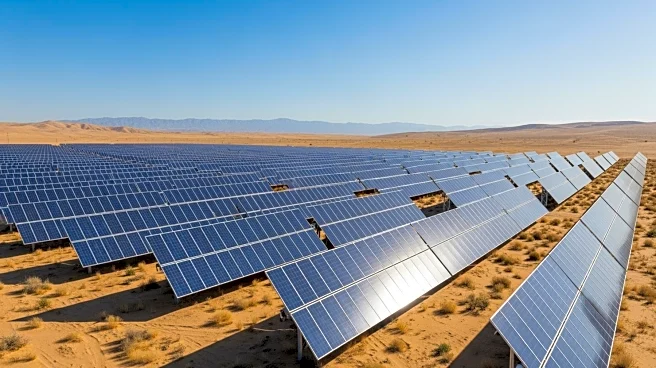What's Happening?
Reliance Industries Ltd. (RIL) is set to begin solar power generation in the first half of the financial year 2026 from its expansive renewable energy project in Kutch, Gujarat. This project spans 550,000 acres, marking a significant step towards the company's
goal of achieving net-zero carbon emissions by 2035. The initiative is part of a $10 billion investment in clean energy, announced by Chairman Mukesh Ambani four years ago. The Dhirubhai Ambani Green Energy Giga Complex in Jamnagar, which is four times the size of Tesla's gigafactory, serves as the hub for this transition. The Kutch site is poised to become one of the world's largest single-site solar power projects, with engineering and feasibility studies completed and land development underway. The solar generation will cater to Reliance's energy needs and support green fuel production, including green hydrogen and sustainable aviation fuel.
Why It's Important?
This development is crucial for India's renewable energy landscape, as it positions Reliance Industries as a key player in the global green energy sector. The project not only supports India's energy transition but also contributes to the country's self-reliance in sustainable energy production. By establishing a comprehensive solar and battery manufacturing chain, Reliance aims to produce 20GWp of solar PV capacity and 100GWh of battery storage, ensuring a consistent power supply. The initiative aligns with India's broader goals of reducing carbon emissions and fostering sustainable development. As Reliance accelerates its green vision, it sets a precedent for other industries to follow suit, potentially influencing policy and investment in renewable energy across the nation.
What's Next?
Reliance Industries plans to expand its solar PV manufacturing capacity and battery giga-factory, with modular scalability to enhance efficiency across the value chain. The company is on track to meet its renewable energy capacity targets, with construction milestones and equipment installation progressing rapidly. The solar panels produced will be integrated into large-scale arrays at the Kutch site, maximizing sunlight capture. Additionally, Reliance aims to produce 3 million tonnes of green hydrogen annually by 2032, focusing on domestic manufacturing of critical components like electrolysers and batteries. This strategic expansion will further solidify India's position as a global leader in renewable energy.
Beyond the Headlines
Reliance's shift towards renewable energy reflects broader ethical and environmental considerations, emphasizing the importance of sustainable practices in corporate strategy. The project highlights the potential for large-scale industrial transformation, reducing reliance on fossil fuels and mitigating climate change impacts. As the company advances its green initiatives, it may influence cultural perceptions of energy consumption and inspire other sectors to adopt eco-friendly practices. The long-term implications include potential shifts in energy policy and increased investment in green technologies, fostering a more sustainable future.

















